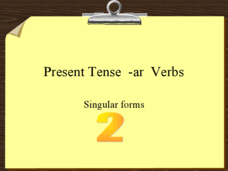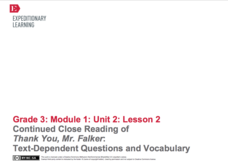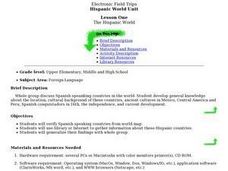Curated OER
What Do You See at the Pond?
With What Do You See at the Pond?, young readers explore pond life and practice reading strategies. Learners first make predictions and then read the simple story independently. After a second read-through with a partner, kids come...
Curated OER
Jugar: Preterite Forms
Practice the preterite form of "jugar" with this useful PowerPoint. There are eighteen fill-in-the-blank sentences for learners to complete. Tip: If you are showing this slideshow during whole class instruction, have students write their...
Curated OER
Present Tense -ar Verbs
Enrich your Spanish lesson with this useful PowerPoint that tests student knowledge of present tense -ar verbs. There are over forty multiple choice/fill-in-the-blank sentences for students to complete. Tip: Use individual whiteboards...
Curated OER
Present tense verb for review
Thirty fill-in-the-blank sentences allow students to practice using present tense verbs in Spanish throughout this PowerPoint. Tip: Complete this as a whole class, then send it to students to practice at home.
Curated OER
Ser vs estar
Determining between the Spanish verbs "ser" and "estar" can be confusing. Use this PowerPoint to practice. There are thirty-eight slides with fill-in-the-blank sentences for students to decide whether "ser" or "estar" is used. Tip:...
Curated OER
Vivir: "to live"
Practice using the Spanish verb "vivir," meaning "to live," in this helpful PowerPoint. It includes fifteen multiple choice/fill in the blank sentences for learners to complete. Tip: Great for whole class and individual practice!
EngageNY
Continued Close Reading of Rain School: Text-Dependent Questions and Vocabulary
The engaging story Rain School is further explored in the third lesson of a larger unit that explicitly teaches close reading skills by answering questions whose answers can only be found inside the text. Through teacher...
EngageNY
Continued Close Reading of Thank You, Mr. Falker: Text Dependent Questions and Vocabulary
In the second lesson plan in a series that revolves around the story, Thank You, Mr. Falker, learners practice the skill of answering direct questions from the text while using complete sentences. After a teacher-led review of how to...
Odyssey of the Mind
Odyssey of the Mind Curriculum Activity: Performing Arts
The classical arts have made a lasting impact on our society and your advanced learners get to find out why. The activity starts as the children create a list of the arts found in society, they discuss how these art forms impact their...
EngageNY
Close Reading of Bullfrog at Magnolia Circle: Main Ideas about the Bullfrog
As your class reaches the end of the book Bullfrog at Magnolia Circle, the seventh lesson in this literary unit helps third graders transition from reading narrative to expository writing. Scholars develop their note-taking skills...
Curated OER
Comic Book Characters
Explore gender stereotypes by analyzing how male and female characters are depicted in comic books. Using the provided Comic Book Analysis sheet, students record the attributes of male and female comic book characters. Then the whole...
Curated OER
Creating Supporting Characters
Supporting characters need detail and characteristics just like a main character. Keep your budding authors entrenched in detail as they write their novels. This lesson focuses on developing supporting characters using personal...
Curated OER
The Whole Story
Young scholars collect and convey information about a current event. By focusing on who, what, when, where, why, and how questions, students study to thoroughly analyze and report on important world events.
Curated OER
The Hispanic World
Go on an electronic field trip. Discover Spanish-speaking countries through Internet exploration. Students participate in a whole group discussion to general knowledge about the location, cultural background, independence and current...
BBC
Sweet Tooth - Full Stops
Young writers engage in a lesson which reinforces the concept of when to use periods, "full stops" as they're called, when writing. There is a terrific online activity built into the plan which gives the kids valuable practice, then a...
Curated OER
Compound Words
First graders discuss what compound words are and what they look like as a whole group. In this compound words lesson, learnerseach have a single word card and pair up with another student to create a compound word. A valuable,...
Curated OER
The Poetry Archive
Listening to poems about feeling lonely and feeling like an outsider set the stage for a group activity that focuses on Stevie Smith's "Not Waving But Drowning." Groups examine the three stanzas of Smith's poem separately and identify in...
Curated OER
Like It Or Not?
Write a review of the film adaptation of Holes. After viewing the film, your young reviewers make recommendations about viewing the film. Using details to support their opinions, they highlight the important parts of the movie without...
Curated OER
Primary Sources and Protagonists: A Native American Literature Unit
Introduce your middle schoolers to the lives of past Native Americans. First, learners work together to put photographs in a sequence. Then, using their sequence, they create stories to share with the whole class. No matter how old your...
Curated OER
To Make a Cake you must say /A/
Here is a great way for learners to practice identifying sounds made by both short and long vowels. This lesson stresses the a_e=/A/ correspondence along with letterboxes. They read their spelled words, whole text selection and...
Curated OER
Skill Building: Alphabet Poem
Amateur poets explore alphabetical poetry. They choose a topic and brainstorm vocabulary that relates to the topic using each letter of the alphabet. The class then generates ideas for a group alphabet poem. After creating one as a whole...
Curated OER
Anti-Semitism Workshop
Originating from the Yad Vashem Holocaust Memorial Museum in Jerusalem, here is a resource to support your world historians in their study of World War II, the Holocaust, your cultural scholars learning about anti-semitism, or your...
Novelinks
Running Out of Time: Anticipation Guide
Get your class ready to read with this anticipatory set for Running Out of Time. Small groups each consider one thought-provoking statement. After each group comes to a consensus, the whole class participates in sharing ideas and voting...
EngageNY
Grade 10 ELA Module 4: Unit 2, Lesson 2
What is the best way to determine the theme of a text? Pupils analyze how central ideas emerge in Shakespeare's tragedy Macbeth. They work in small groups and engage in a whole-class discussion to discuss the play's plot. Finally,...
Other popular searches
- Whole Language Lesson Plans
- Whole Language Approach
- Whole Language Development
- Reading Whole Language
- Whole Language Method
- Whole Language Instruction
- Whole Language Shared Reading
- Language Arts Whole Class
- Esl Whole Language Method
- \"Whole Language Approach\























